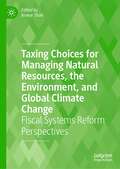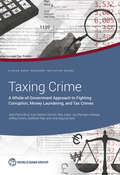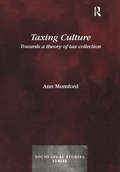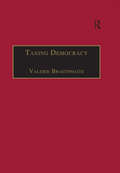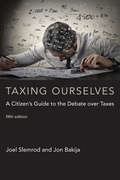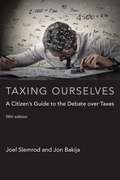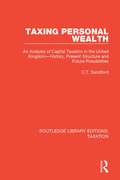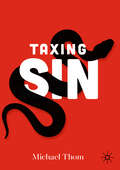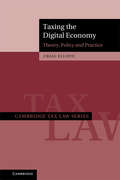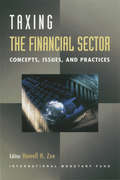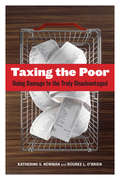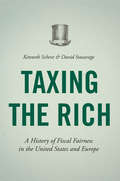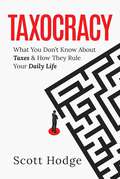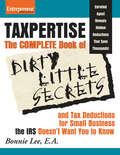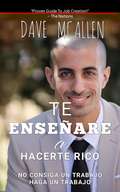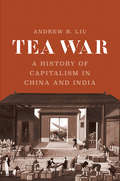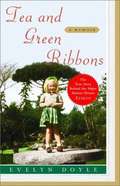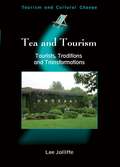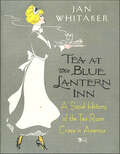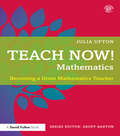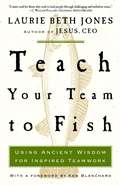- Table View
- List View
Taxing Choices for Managing Natural Resources, the Environment, and Global Climate Change: Fiscal Systems Reform Perspectives
by Anwar ShahThis book reviews taxing choices to protect the local and global environment and preserve and sustain natural resources. Alternative economic instruments such as carbon taxes and tradable permits to combat global climate change are also examined. Strategies and practices for the managing and sharing of revenues from natural resources are highlighted. Also, roles of various orders of government in managing, taxing, and sharing natural resources in selected countries are documented to highlight the impact of such division of responsibilities in preserving natural resources and the environment. The susceptibility of resource revenue dependent economies to corruption and malfeasance, and the Dutch disease, is also highlighted. This book could serve as a supplementary reference book for graduate and undergraduate courses and as a sourcebook for journalists, researchers, policymakers, and government practitioners.
Taxing Crime: A Whole-of-Government Approach to Fighting Corruption, Money Laundering, and Tax Crimes (StAR Initiative)
by Jean-Pierre Brun Rita Julien Ana Gomez Ndubai Yara Soto Siddhesh RaoTaxing Crime: A Whole-of-Government Approach to Fighting Corruption, Money Laundering, and Tax Crimes examines how tax audits and investigations can lead to uncovering white-collar crime and how investigations of corruption can, in turn, lead to prosecutions of tax evasion or recovery of unpaid taxes. Prepared jointly by the World Bank and the United Nations Office on Drugs and Crime (UNODC) Stolen Asset Recovery Initiative (StAR) and the Global Tax Policy Center at the Institute for Austrian and International Tax Law, Vienna University of Economics and Business, this report offers analysis, case studies, examples of legal and operational frameworks, and recommendations that policy makers can use to enhance cooperation between tax authorities and law enforcement agencies at the national and international levels. This study is designed to serve as a reference and source of advocacy for policy makers, but it may be useful to other practitioners as well, including law enforcement offi cials, investigating magistrates, and prosecutors. Specifically, chapters present strategic considerations for establishing communication channels between tax and criminal investigative agencies; suggestions for combining tax and financial crime prosecution as part of an interagency asset recovery strategy; and approaches to developing interagency information exchange at the regional and international levels. It concludes with recommendations on ways to enhance the roles of both the tax authorities in combating money laundering and corruption and of the law enforcement authorities in recovering the proceeds of tax crimes. • Chapter 1 provides an introduction. • Chapter 2 presents strategic considerations for establishing information exchange channels between tax and criminal investigative agencies. • Chapter 3 explains how to combine tax and financial crime prosecution as part of an interagency asset recovery strategy. • Chapter 4 discusses approaches to developing interagency information exchange at the regional and international levels. • Chapter 5 provides recommendations for future efforts to enhance the role of tax authorities in supporting efforts to combat money laundering and corruption, and the role of law enforcement authorities in the recovery of proceeds of tax crimes. • The appendix contains case studies that illustrate effective interagency cooperation, including at the international level.
Taxing Culture: Towards a Theory of Tax Collection Law (Socio-Legal Studies #14)
by Ann MumfordThe introduction of self-assessment for income tax collection in the late 1990s marked a striking moment of cultural convergence between the UK and the US. This book analyses the socio-political factors leading to and resulting from this fundamental change in the relationship between taxpayers and the Inland Revenue, using perspectives in comparative law and the new outlooks of modern tax and cultural theory. It will be of interest to those studying theories of compliance, cultural legal studies, and law and society.
Taxing Democracy: Understanding Tax Avoidance and Evasion
by Valerie BraithwaiteThe integrity of tax systems as we know them are being challenged throughout the world. Tax avoidance schemes of various kinds are proving increasingly attractive and lucrative to wealthy individuals and large corporations. As governments fear the erosion of their tax base among those who are most able to contribute, the public is looking on, as one of its most public institutions attempts to re-invent itself through changing laws and administrative procedures. In this book, a number of experts develop the idea of responsive regulation in relation to taxation. They demonstrate how law in this area is undermining social norms and social norms are undermining law. A key factor in their analysis is the perception of justice. Explanations as to why the integrity of tax systems is under siege, and possible solutions, are examined.
Taxing Ourselves, fifth edition: A Citizen's Guide to the Debate over Taxes (The\mit Press Ser.)
by Joel Slemrod Jon BakijaThe new edition of a popular guide to the key issues in tax reform, presented in a clear, nontechnical, and unbiased way.To follow the debate over tax reform, the interested citizen is often forced to choose between misleading sound bites and academic treatises. Taxing Ourselves bridges the gap between the oversimplified and the arcane, presenting the key issues clearly and without a political agenda. Tax policy experts Joel Slemrod and Jon Bakija lay out in accessible language what is known and not known about how taxes affect the economy and offer guidelines for evaluating tax systems—both the current tax system and proposals to reform it. This fifth edition has been extensively revised to incorporate the latest data, empirical evidence, and tax law. It offers new material on recent tax reform proposals, expanded coverage of international tax issues, and the latest enforcement initiatives. Offering historical perspectives, outlining the basic criteria by which tax policy should be judged (fairness, economic impact, enforceability), examining proposals for both radical change (replacement of the income tax with a flat tax or consumption tax) and incremental changes to the current system, and concluding with a voter's guide, the book provides readers with enough background to make informed judgments about how we should tax ourselves.Praise for earlier editions“An excellent book.”—Jeff Medrick, New York Times“A fair-minded exposition of a politically loaded subject.”—Kirkus Reviews
Taxing Ourselves: A Citizen's Guide to the Debate over Taxes
by Joel Slemrod Jon BakijaTaxing Ourselves bridges the gap between the oversimplified and the arcane, presenting the key issues clearly and without a political agenda. Tax policy experts Joel Slemrod and Jon Bakija lay out in accessible language what is known and not known about how taxes affect the economy and offer guidelines for evaluating tax systems―both the current tax system and proposals to reform it.
Taxing Personal Wealth: An Analysis of Capital Taxation in the United Kingdom—History, Present Structure and Future Possibilities (Routledge Library Editions: Taxation #10)
by C.T. SandfordThis book, first published in 1971, presents an analysis of the taxes levied on wealth or capital – death duties, annual wealth taxes and capital gains taxes. It provides a comprehensive study of these taxes, and recommends a series of measures, including the replacement of certain taxes, that would promote equality. The book also provides a masterly historical summary of death duties in the UK.
Taxing Sin
by Michael ThomConventional wisdom dictates that those goods which are said to cause harm or impose costs on society deserve a special tax. For centuries, governments have levied these "sin taxes" on alcohol and tobacco, but the list of taxable sins has now grown to include soda and marijuana, with calls to impose further taxes on plastic bags, meat, and even robots and carbon. Contrary to what experts and policymakers tell us, many of these alleged sins impose very little, if any, cost on society, and the harms that do exist can be minimized without resorting to tax. What follows in this book is a discussion of four case studies—on tobacco, marijuana, alcohol and soda—which make the case against the conventional wisdom in taxing these "sins", before concluding that when it comes to taxing sin, it is time for governments to forgive—and forget.
Taxing Situations: Two Cases on Income Taxes and Financial Reporting
by William J. Bruns Jr. Susan S. HarmelingTwo whimsical situations are described to provide illustrations of situations where income taxes paid differ from the income tax expense that might be included in financial reports. In addition to illustrating that financial reported income may differ from taxable income, the case contains data, to allow students to discover the reasons for and nature of a deferred tax account.
Taxing the Digital Economy: Theory, Policy and Practice (Cambridge Tax Law Series)
by Craig ElliffeThe question of how to tax multinational companies that operate highly digitalised business models is one of the most contested areas of international taxation. The tax paid in the jurisdictions in which these companies operate has not kept pace with their immense growth and the OECD has proposed a new international tax compromise that will allocate taxing rights to market jurisdictions and remove the need to have a physical presence in the taxing jurisdictions in order to sustain taxability. In this work, Craig Elliffe explains the problems with the existing international tax system and its inability to respond to challenges posed by digitalised companies. In addition to looking at how the new international tax rules will work, Elliffe assesses their likely effectiveness and highlights features that are likely to endure in the next waves of international tax reform.
Taxing the Financial Sector: Concepts, Issues, and Practice
by Howell H. ZeeThe papers in this volume address the tax treatment of the primary institutions, products, and services that make up the financial sector: banks, insurance companies, securities companies, investment funds, pension funds, and derivatives. Five of the six papers were originally prepared as background materials for a technical assistance mission of the IMF's Fiscal Affairs Department to China in September 2002 to discuss the taxation of China's financial sector.
Taxing the Poor: Doing Damage to the Truly Disadvantaged
by Katherine S. Newman Rourke O’brienThis book looks at the way we tax the poor in the United States, particularly in the American South, where poor families are often subject to income taxes, and where regressive sales taxes apply even to food for home consumption. Katherine S. Newman and Rourke L. O'Brien argue that these policies contribute in unrecognized ways to poverty-related problems like obesity, early mortality, the high school dropout rates, teen pregnancy, and crime. They show how, decades before California's passage of Proposition 13, many southern states implemented legislation that makes it almost impossible to raise property or corporate taxes, a pattern now growing in the western states. Taxing the Poor demonstrates how sales taxes intended to replace the missing revenue--taxes that at first glance appear fair--actually punish the poor and exacerbate the very conditions that drove them into poverty in the first place.
Taxing the Rich: A History of Fiscal Fairness in the United States and Europe
by David Stasavage Kenneth ScheveIn today's social climate of acknowledged and growing inequality, why are there not greater efforts to tax the rich? In this wide-ranging and provocative book, Kenneth Scheve and David Stasavage ask when and why countries tax their wealthiest citizens--and their answers may surprise you.Taxing the Rich draws on unparalleled evidence from twenty countries over the last two centuries to provide the broadest and most in-depth history of progressive taxation available. Scheve and Stasavage explore the intellectual and political debates surrounding the taxation of the wealthy while also providing the most detailed examination to date of when taxes have been levied against the rich and when they haven't. Fairness in debates about taxing the rich has depended on different views of what it means to treat people as equals and whether taxing the rich advances or undermines this norm. Scheve and Stasavage argue that governments don't tax the rich just because inequality is high or rising--they do it when people believe that such taxes compensate for the state unfairly privileging the wealthy. Progressive taxation saw its heyday in the twentieth century, when compensatory arguments for taxing the rich focused on unequal sacrifice in mass warfare. Today, as technology gives rise to wars of more limited mobilization, such arguments are no longer persuasive.Taxing the Rich shows how the future of tax reform will depend on whether political and economic conditions allow for new compensatory arguments to be made.
Taxocracy: What You Don't Know About Taxes and How They Rule Your Daily Life
by Scott HodgeTaxocracy: What You Don&’t Know About Taxes and How They Rule Your Daily Life won&’t help you lower your tax bill, but it will help you understand how politicians use taxes to influence our lives, how taxes harm the economy, and why we need a simpler tax system.Did you ever wonder why the costs of health care, housing, and college tuition keep going up? Or how your neighbor could afford that fancy electric car? Or why there are so many hard seltzers on the market? Your first guess might not be &“taxes,&” but they play a big role. We live in a world ruled by taxes—a taxocracy. History is full of misguided tax policies that led to &“see-through&” buildings, tax-free attics, three-wheeled cars, women in children&’s clothing, and baked chips to go along with our hard seltzer. Written by former Tax Foundation CEO Scott Hodge, Taxocracy: What You Don&’t Know About Taxes and How They Rule Your Daily Life uses amusing lessons from past tax policies gone wrong to explore how the US tax code caused serious consequences, affecting how we get our health insurance, the price of a college education, what car we buy, where we bank, and, in some cases, even when we die. Taxocracy outlines economic principles for designing a tax code that doesn&’t rule our daily lives—a tax code that promotes economic growth, free-enterprise, and takes the politics out of tax policy.
Taxpertise
by Bonnie LeeTaxpayer champion and enrolled agent Bonnie Lee puts the IRS under the microscope and uncovers proven methods, and surprisingly simple strategies to minimize your taxable income, maximize deductions, and, ultimately-add thousands back to your business' bottom line! Do you owe an insurmountable sum to the IRS? Pay pennies on the dollar. Secret formula the IRS uses to determine an acceptable offer is revealed-Page 246 Save tax dollars simply by reorganizing your workspace-Page 17 Stuff tax dollars back into your pocket by fixing errors on your balance sheet-Page 50 Eat tax-free! Some meal expenses are 100 % deductible. Find out what qualifies-Page 56 Got a great hobby you're turning into a bona fide business? Deduct the losses by following these guidelines-Page 99 Is your home office a red flag?-Page 107 You inherited Grandma's house. Do you have to pay taxes on it?-Page 121 Can you write off your clothing?-Page 133 Under IRS audit? Learn "audit speak" to deal effectively with the IRS-Page 215
Taylor Fresh Foods
by Natalie Kindred David E. Bell Mary ShelmanIn 13 years, Bruce Taylor had built Taylor Fresh Foods into a $1 billion company and the top supplier of salads to the U.S. food service industry and to supermarket deli departments. In 2008, he was convinced that the time was right to make a big push in the fresh food area to satisfy consumers that were demanding more convenient, natural, good-tasting, and locally-grown foods. Bruce needed an action plan to make Taylor Fresh the industry leader before his competition woke up to the opportunity that lay before them all.
Te enseñaré a hacerte rico: No consiga un trabajo Haga un trabajo
by Dave McAllemLa gente no da lo que no tiene. Dave McAllen tiene trabajos. A los que escuchan, les da trabajo. Gana mucho dinero después de investigar las frustraciones y dolores más profundos de las personas y crear productos especiales que están sin explotar para ayudarlos a encontrar respuestas y soluciones. Entonces, si estás aquí, seguro que conseguirás el trabajo de tus sueños. Él le mostrará exactamente cómo gana miles cada semana con estos productos, en su conciencia de riqueza. Te enseñaré a hacerte rico, es un libro sobre los secretos de la riqueza de los exitosos y cómo aprovecharlos. Dave presenta a los lectores una guía práctica y probada para orientar los ingresos bajo demanda a nivel mundial, 24 horas al día, 7 días a la semana. Él le enseñará cómo hacer estos productos que aportan ese dinero y hacen su propio trabajo. Con esto, no buscará 50 formas de conseguir un trabajo. Esta es una garantía de trabajo.
Tea War: A History of Capitalism in China and India
by Andrew B. LiuA history of capitalism in nineteenth†‘ and twentieth†‘century China and India exploring the competition between their tea industries Tea remains the world’s most popular commercial drink today, and at the turn of the twentieth century, it represented the largest export industry of both China and colonial India. In analyzing the global competition between Chinese and Indian tea, Andrew B. Liu challenges past economic histories premised on the technical "divergence" between the West and the Rest, arguing instead that seemingly traditional technologies and practices were central to modern capital accumulation across Asia. He shows how competitive pressures compelled Chinese merchants to adopt abstract, industrial conceptions of time, while colonial planters in India pushed for labor indenture laws to support factory-style tea plantations. Further, characterizations of China and India as premodern backwaters, he explains, were themselves the historical result of new notions of political economy adopted by Chinese and Indian nationalists, who discovered that these abstract ideas corresponded to concrete social changes in their local surroundings. Together, these stories point toward a more flexible and globally oriented conceptualization of the history of capitalism in China and India.
Tea and Green Ribbons: A Memoir
by Evelyn Doyle[From the dust jacket:] "In the slums of Dublin in 1953, Evelyn Doyle's mother ran off with a lover, abandoning her family and leaving Evelyn's father to care for six children. Already struggling to support his children as a painter and decorator, Desmond Doyle faced the fact that he would have to turn them over to church-run industrial schools while he went to England, where he could earn higher wages and save money to support them without state assistance. He believed the placement was temporary. However, upon his return to Dublin several months later, he discovered that the Irish state had assumed custody of the children and refused to release them. Tea and Green Ribbons is the astonishing, heart-wrenching tale of Desmond's dramatic quest to get his children back, told in gripping fashion by his daughter, Evelyn. In the ensuing years after losing his children, Desmond devoted himself to working with some of Ireland's foremost legal experts to fight both the Church and the government. Meanwhile Evelyn, his eldest child, discovered the crisp, clean joys and lonely sorrows of life in the care of nuns. After two years the Irish Supreme Court finally made an unprecedented decision--which, for the first time in Irish legal history, took into account the children's wishes--and Desmond, his daughter, and his sons began their lives again. Evelyn Doyle has crafted a jewel-like chronicle of a major turning point in Irish mores and culture. Uplifting, gritty, and emotionally compelling, this stunning memoir is an unforgettable celebration of the Irish spirit."
Tea and Tourism
by Lee JolliffeThe global production, marketing and consumption of tea present a resource for tea-related tourism. Tea and Tourism: Tourists, Traditions and Transformations profiles tea cultures and examines the social, political and developmental contexts of using related traditions for touristic purposes. This volume views tourism related to tea from differing disciplinary perspectives, and from marketing, planning, entrepreneurial and developmental viewpoints. The book examines the transformation of indigenous and imported tea traditions into experiences for tourists. Profiling these tea experiences from around the world including the United Kingdom; Sri Lanka; India; China; Taiwan; Kenya and Canada the volume reveals the ways in which tea's heritage is adapted for tourism consumption. This is the first definitive work on tea tourism. Global tea tourism trends are identified, while case examples provide fresh perspectives on the ongoing transformation of tea for tourism purposes.
Tea at the Blue Lantern Inn: A Social History of the Tea Room Craze in America
by Jan Whitaker“A delightful tour of the tearooms that dotted the nation in the first half of the twentieth century . . . [an] irresistible slice of American popular culture.” —BooklistThe Gypsy Tea Kettle. Polly’s Cheerio Tea Room. The Mad Hatter. The Blue Lantern Inn. These are just a few of the many tea rooms—most owned and operated by women—that popped up across America at the turn of the last century, and exploded into a full-blown craze by the 1920s. Colorful, cozy, festive, and inviting, these new-fangled eateries offered women a way to celebrate their independence and creativity. Sparked by the Suffragist movement, Prohibition, and the rise of the automobile, tea rooms forever changed the way America eats out, and laid the groundwork for the modern small restaurant and coffee bar.In this lively, well-researched book, Jan Whitaker brings us back to the exciting days when countless American women dreamed of opening their own tea room—and many did. From the Bohemian streets of New York’s Greenwich Village to the high-society tea rooms of Chicago’s poshest hotels, from the Colonial roadside tea houses of New England to the welcoming bungalows of California, the book traces the social, artistic, and culinary changes the tea room helped bring about.Anyone interested in women’s history, the early days of the automobile, the Bohemian lives of artists in Greenwich Village, and the history of food and drink will revel in this spirited, stylish, and intimate slice of America’s past.“The book is both informative and clear-eyed, and leavened with wonderful illustrations.” —House & Garden
Teach Business English
by Penny Ur Sylvie DonnaThis book provides a practical introduction to Business English for new and experienced teachers, and deals with a range of issues from needs analysis and course planning to testing and evaluation.
Teach For China and the Chinese Nonprofit Sector
by William C. Kirby Erica M ZendellTeach For China was founded in 2008 with the mission of expanding educational opportunity across China. By 2013, Andrea Pasinetti's lofty dream had taken flight: over 300 graduates from top American and Chinese universities were participating in its 2-year teaching fellowships in more than 87 rural Chinese schools. The organization had grown from a founding team of three in a shoebox office to an 80-person operation headquartered in Beijing with teams in six other locations across China. Teach For China adapted the model pioneered by Teach For America to meet the needs of the educationally under-resourced of rural China. Led by an American, could Teach For China reshape its international identity and become an enduring Chinese institution? Could Teach For China manage regulatory risks and challenge public and government skepticism of the still-nascent and highly volatile nonprofit sector? Would Teach For China be able to sustainably scale its model to truly end educational inequality in China?
Teach Now! Mathematics: Becoming a Great Mathematics Teacher (Teach Now!)
by Julia UptonBeing taught by a great teacher is one of the great privileges of life. Teach Now! is an exciting new series that opens up the secrets of great teachers and, step-by-step, helps trainees to build the skills and confidence they need to become first-rate classroom practitioners. Written by a highly-skilled practitioner, this practical, classroom-focused guide contains all the support you need to become a great mathematics teacher. Combining a grounded, modern rationale for learning and teaching with highly practical training approaches, the book guides you through the themes of mathematics teaching and the skills needed to demonstrate learning. Teach Now! Mathematics also offers clear, straightforward advice on classroom practice, lesson planning and working in schools. Teaching and learning, planning, assessment and behaviour management are all covered in detail, with a host of carefully chosen examples used to demonstrate good practice. Every example is rooted in recent experience in the mathematics classroom. The commonalities of teaching pedagogy across all subjects are discussed but this book gets to the heart of the unique nature of this subject. From building confidence to developing problem-solving skills and mathematical literacy, this book considers what the keys to success are in learning, and hence teaching, mathematics. There are also chapters on dealing with pressure, excelling in observations, finding the right job and succeeding at interview. Throughout the book, there is a great selection of ready-to-use activities, strategies and techniques which will help put you on the fast track to success in the classroom. With a strong emphasis on sparking students' interest and enthusiasm in mathematics, this book is your essential guide as you start your exciting and rewarding career as an outstanding mathematics teacher.
Teach Your Team to Fish: Using Ancient Wisdom for Inspired Teamwork
by Laurie Beth JonesLaurie Beth Jones has given hundreds of thousands of business readers insight into how the ideas of Jesus can be used to enhance performance. One of the most critical work areas for anyone, whether a manager or a CEO, a teacher or a pastor, is cooperative teamwork. Leaders today face their greatest challenges not only in defining strategies and getting updated information but also in getting diverse human beings to pull together without falling apart.Jesus can be a role model for team leaders everywhere. When Jesus called out to his future disciples, "Follow me, and I will make you fishers of men," he transformed them from people who worked for themselves to people who were part of a larger team. Jesus was constantly exhorting his people to "gather in my name" and "go out two by two" and always think and pray "as one." Jesus' final prayer was "that they might be one, Father, even as you and I are one," which is ultimately about union and communion, common values and purpose--all of which form the bedrock of an inspired team.Teach Your Team to Fish offers dozens of stories from the Bible showing how Jesus managed his team of disciples and other followers, with suggestions for how to apply these lessons to real-world teambuilding and management problems. It offers guidance and inspiration on:* how to excite your team in order to motivate them;* how to ground them so they'll be realistic about what can be achieved; * how to transform them into a truly well-functioning team; * and how to release them into the world to improve other teams elsewhere.Along the way, the book gives examples of companies in which teams work well together and offers lessons that can help team leaders everywhere sustain themselves and achieve their common goals.From the Hardcover edition.
